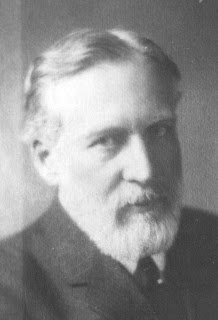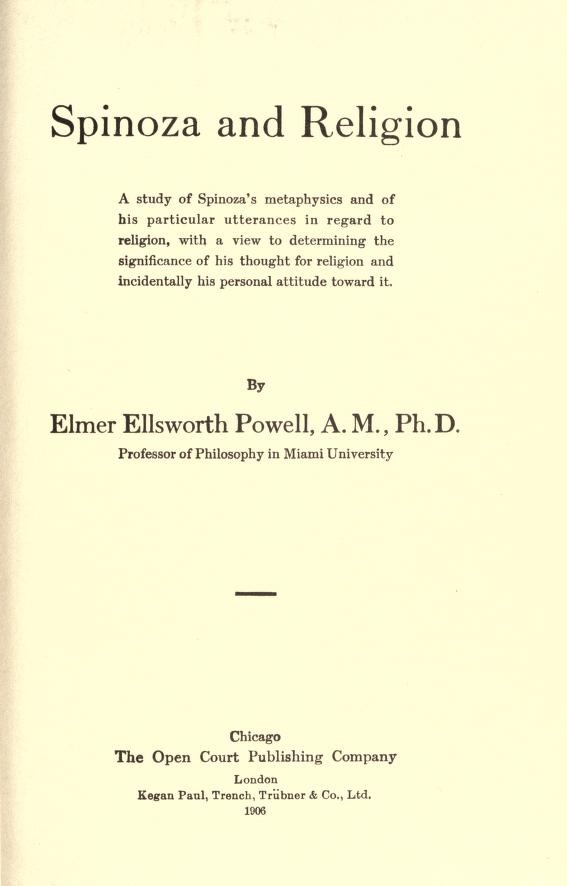Elmer Ellsworth Powell (1861- 1947) - Methodist - schreef "Spinoza and Religion"
Hier volgt weer zo’n blog waarin informatie wordt bijeengebracht die verder nergens zo te vinden is. 
• Spinozas Gottesbegriff. Abhandlungen zur Philosophie und ihrer Geschichte, Heft 12. Halle a. S. [Halle an der Saale], Max Niemeyer, 1899. ix, 113 p. [Toevoeging 11-10-2016] Een reprographischer Nachdruck bij Georg Olms Verlag, 1980 bij books.google.
Hier een review van dit werk
Spinozas Gottesbegriff. Von Elmer E. Powell. Halle, Max Niemeyer, 1899. — pp. 113
In the preface, the author, while
referring to the fact that the literature on Spinoza's philosophy is constantly
increasing, points out that, since the publication of the Korte Verhandeling, Spinoza's conception of God has not been made
the subject of a special investigation. The main purpose of the work is
apparently to determine whether this conception is adapted to the demands of a
philosophy of theism; and the conclusion reached is that the Spinozistic God
and the God of theism have nothing in common but the name. In the Korte Verhandeling, presumably Spinoza's
first work, the pantheistic position is clearly indicated, and the suggestions
of theism occurring in the later works arise largely, as the writer shows, from
Spinoza's terminology, probably used purposely, in order to recommend his
philosophy to the general reader. After discussing in the introduction the
methodological presuppositions of Spinoza's philosophy, and the meanings of
some of the terms employed, particularly that of the term ‘idea,’ the writer
takes up in order the doctrines of substance, attribute, and mode, and shows
that Spinoza constantly endeavors, though vainly, to equate substance as wholly
indeterminate with substance as infinitely determined. The difference between
the wholly indeterminate and the infinitely determined is then shown to be the
difference between intellectus absolute
infinitus and absoluta cogitatio.
The former is simply a term for the aggregate of all adequate ideas, and
possesses no unity, save that it arises from, or is the consequence of,
absoluta cogitatio, which possesses the simple nature of the entirely undifferentiated,
and so presents the extreme opposite of consciousness. Just as the term God is
applied both to simple substance and to substance as differentiated in the eternal
modes, so in the present case intellectus
infinitus and absoluta cogitatio
are both included under the phrase idea
dei; but in neither of its two possible meanings does this phrase imply
consciousness in the proper sense of the term, as is especially apparent in the
earlier work.
References to sources and to other writers are fairly numerous; the style and
arrangement are excellent, and, taken altogether, it is a very readable book.
B. H. Bode.
University of Wisconsin. In: THE PHILOSOPHICAL REVIEW. [Vol. XI.]
[(1902-11-01], p. 657-58 [archive.org]
Na zijn promotie ging Powel terug naar de Verenigde Staten, werd er eerst docent moderne talen aan het Franklin en Marshall College in Lancaster. In 1905 werd hij aan de Universiteit van Miami benoemd tot hoogleraar in de filosofie. Hij schreef vele boeken. In 1922 ging hij met emeritaat.
 "His most notable work Spinoza and Religion published in 1906, was revised by him in 1941, when he was eighty years old." Aldus het doodsbericht in The Miami Student, The oldest College Newspaper in the United States, Friday, July 11, 1947, die berichtte dat de Eminent Scholar op 6 juli 1947 na een ziekbed van een week in zijn eigen huis overleed. [pdf]
"His most notable work Spinoza and Religion published in 1906, was revised by him in 1941, when he was eighty years old." Aldus het doodsbericht in The Miami Student, The oldest College Newspaper in the United States, Friday, July 11, 1947, die berichtte dat de Eminent Scholar op 6 juli 1947 na een ziekbed van een week in zijn eigen huis overleed. [pdf]
• Elmer Ellsworth Powell, Spinoza and Religion. A study of Spinoza’s metaphysics and of his particular utterances in regard to religion, with a view to determining the significance of his thought for religion and incidentally his personal attitude toward it. The Open Court Publishing Company, Chicago, 1906 [te vinden bij archive.org en elders als PDF]

• Spinoza and his religion. Boston : Chapman and Grimes, [c1941]
Wegens het rechtenvrij zijn vindt je van zijn boek uit 1906 vele herdrukken aangeboden op internet [hier een overzicht].
Ik heb meermalen op Powell's methodisme gewezen hetgeen iemand op z'n hoede moet maken: hebben we hier misschien met een nieuwe Van Blijenbergh te doen? En inderdaad... Om een idee te krijgen van de intentie van dit boek neem ik hier een deel over van de bespreking door Walter Eckstein in The Journal of Religion [Vol. XXIII, July 1943, Number 3]
"[I]t is the very charge of atheism which constitutes the main content of a recently republished book, Spinoza and Religion by Elmer E. Powel. The thesis of this book is that Spinoza, an atheist at heart, was dominated in all his actions by an excessive timidity and that it was this timidity which caused him to cloak his atheistic philosophy in the phraseology of religion. It was this timidity which determined him to publish his Theological-Political Treatise anonymously and to adjure his friends in his first delineation of his own philosophy, in his Short Treatise on God, Man and His Well-Being, to be cautious in communicating his philosophical ideas to other people. Had not he even engraved the word "Cautious" on his seal ring? Powell cals this "a significant fact, well illustrating how great a role prudence played in his life." It was this prudence and timidity, according to Powell, that induced Spinoza to conceal his real opinions when dealing with people with religious interest and even to express religious thought they were diametricaly opposed to his own.
Moreover, in Powell's opinion, Spinoza was a person in whom sentiment found little place. "The claims of the creative imagination were allowed neither in his life nof in his system." He had no interest in art, and "the most beautiful creations of poetry such as Ariosto's 'Roland' were for him mere trumpery (nugae)." In quoting these latter remarks from Freudenthal, Powell comes to the conclusion that evidently to expect to find in Spinoza a strong religious interest would be as unwarrantable as to look for lilies at the North Pole. But - to take this last point first - has anyone ever come to a similar conclusion with regard to Plato? And did not Plato speak of Homer in a much more depreciative way? And did he not also consider the essence of all art to be imitation, which to him meant something very base? Yet who would deny that Platonism was one of the constituents of Christian theology from Augustine to modern times." [Hier]
Powell Lectures in Psychological Theory.
Carl Murchison die directeur was van het psychologisch laboratorium van Clark University kon Elmer Ellsworth Powel, zijn welgestelde schoonvader, in 1925 overtuigen van het nut van het financieren van de Powell Lectures in Psychological Theory. Murchison hoopte op die manier te bereiken dat psychologen minder werden geïndoctrineerd tot één school, structuralisten of behavioristen. [zie in books.google en hier]

_______________
De bovenste portretfoto van Elmer Ellsworth Powell is een uitsnede uit een foto van Frank R. Snyder op Flickr.com
De onderste foto van Dr. E.E. Powell is uit de al vermelde The Miami Student van 11 juli 1947. [PDF] Ik heb lang gezocht naar Powell's sterfdatum. Die vond ik eindelijk toen ik op de website van de Miami University ging zoeken; daar bleken deze kranten gedigitaliseerd te staan.
De informatie over zijn levensloop heb ik uit zijn cv op de laatste pagina's van zijn dissertatie en uit het overlijdensbericht.
Een 30 dec. 1917 ingezonden brief werd gepubliceerd in The New York Times, January 03, 1918: ELMER ELLSWORTH POWELL, A BETTER WAR MACHINE.; A Rapid and Thorough Overhauling Is Urged.

